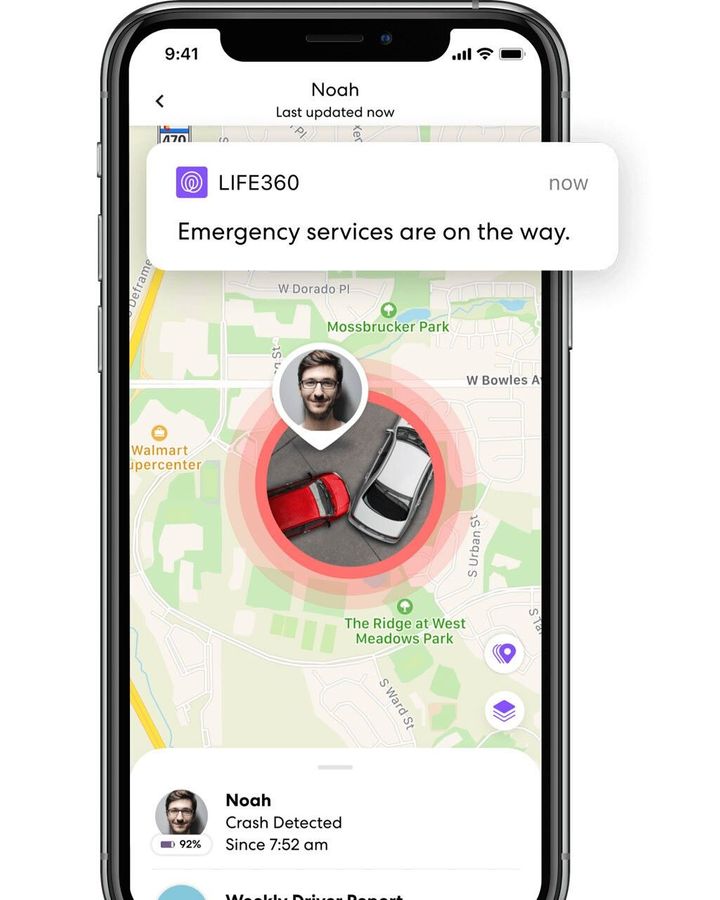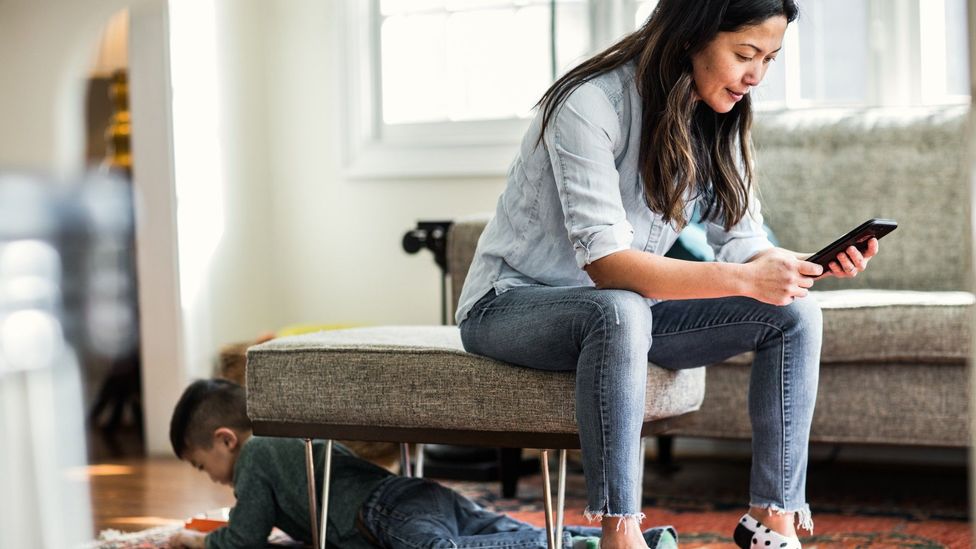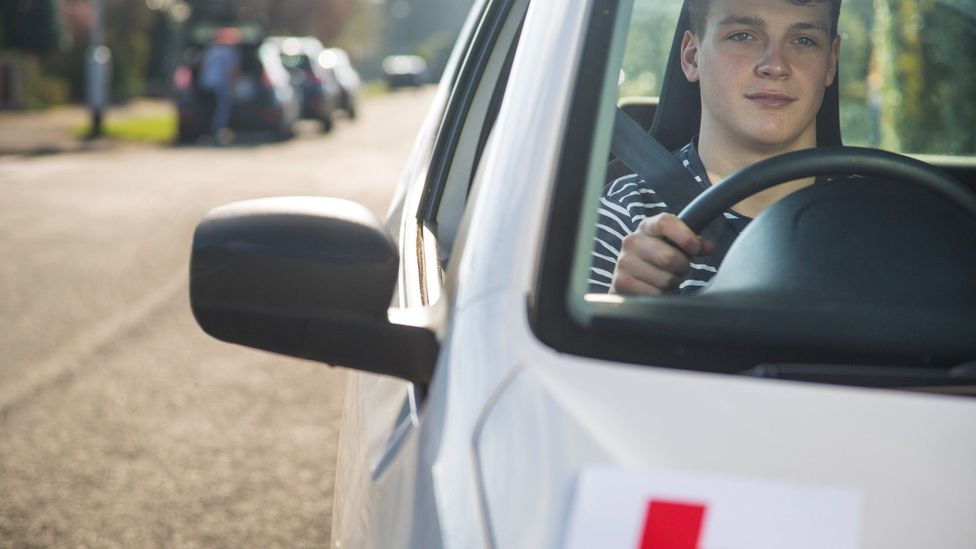Can the Other Family Member Who Is on Your Plan Know You Have Locate My Family Member on Your Phone
The parents who rail their children

Kid-tracking apps are growing. Although they help parents keep tabs, are they hurting families in in commutation for peace of listen?
Due east
Elaine Spector was anxious to hear whether her son had safely gotten dorsum to his dorm in Texas, after a recent visit habitation. But rather than waiting for him to call or text, the Baltimore, United states of america-based mum was carrying on with her solar day, and awaiting a reassuring ding from her telephone.
That's because, like 32 meg people around the world, Spector and her whole family have Life360 installed on their phones. The app keeps constant tabs on the whereabouts of her 3 children, letting her know when they're on the motility, when they're safely home, if they're somewhere they shouldn't be and a whole host of other information. "They got to school, ding. They got habitation, ding," says Spector, a patent chaser. "Information technology'due south just a manner for us to know as a family where everybody is."
The family have used the app for several years now, and Spector says while her younger children tend to plow off their locations at times, her oldest son has always been relaxed almost using it. But even though he is at present xviii and living across the land, she admits the idea of him removing the app and taking away those reassuring dings "makes me feel stressed". "I don't desire to be the helicopter parent, but we've had this for a while, and in that location'south a office of me that'southward hesitant to totally cut it off," she says. "I like this subtle part of, 'he'southward safety and I don't demand to pester him'."
Family-tracking apps have exploded in popularity over the past decade or so. A parent's natural instinct to protect their children is a component of growth, of course – merely these apps keep booming as many parents feel the world – both off and online – is inherently and increasingly dangerous.
Notwithstanding experts say parents wanting to utilise them should think very hard about how they''ll do so, and how they'll talk to their children about them. Apps are becoming ever more sophisticated in the information they're gathering, raising questions about personal security. And children raised beingness app-monitored are at present reaching machismo, leaving the parents with the quandary – when do you turn them off?
Geofencing, speed monitoring and more
While Life360 dominates the family tracking market – it's currently the sixth most downloaded social media app on the iOS App store in both the UK and US – there is a vast assortment of software bachelor, all offering parents varying degrees of monitoring.
Ghislaine Bombusa, caput of digital at UK-based Internet Matters, which advises parents on internet safety, says at that place are essentially two types of tracking options. The selection betwixt the two "depends on your blazon of parenting, in terms of how closely you want to monitor your kid".
The simplest are location-sharing apps, which come installed on phones like Find My Friends on iOS devices, or Google Family unit for Android. There are also third-party apps that enable users to gather a seemingly limitless range of data from continued phones.
At the basic end, this includes features such equally geofencing, and so an warning is sent when a phone leaves or enters a certain area. For parents with teen drivers, there's likewise speed monitoring and crash detection – something Spector says she has found particularly useful. On the more extreme cease of the marketplace, apps similar FindMyKids let a parent to remotely activate the microphone on their child's phone and fifty-fifty record audio, while TeenSafe boasts a "stealth way" which, says the company, ways the child volition "never discover out that their parents are tracking them".

Apps such as Life360 can offer a range of services, including monitoring driving (Credit: Life360)
Family Tree
This story is part of BBC'southward Family Tree series, which examines the issues and opportunities parents, children and families face today – and how they'll shape the world tomorrow. Coverage continues on BBC Future.
Beyond physical tracking, apps can besides manage a child's digital life, "whether it's what they're spending if you've got an allowance online, how they use gaming consoles, when they're using information technology", says Bombusa. Apps like OurPact allow a parent to see screenshots of their child's online interactions, while Bark actually scans their messages to alert parents to "apropos interactions".
While Bombusa doesn't believe all parents are now using such apps, she says their proliferation and the amount of investment in them is certainly indicative of high demand. One 2019 survey of parents and guardians in the Uk constitute that 40% were using some kind of GPS tracking on a daily footing.
And they are big business organisation. Life360 alone has been valued at over $1bn, and operates in more than 140 countries. While many apps exercise have costless options, most also offer the option of upgrading to paid accounts for boosted features or to connect more devices. Circle for example, which monitors internet use, starts at $9.99 (£seven.39) a month, and TeensSafe's five-device plan is currently $99.99 a calendar month.
Data versus trust
Location tracking apps marketplace themselves every bit essential parenting tools in a earth total of danger. They rely on parents believing that equally long equally they know where their child is, they will be safer, or that kids will steer clear of risky behaviour if they know they're existence watched. And there have certainly been cases in which parents have used tracking apps to observe teenagers who have had an accident, or even been abducted.
But Sonia Livingstone, a professor in the department of media and communications at the London School of Economic science and Political Science, believes at that place is in fact "goose egg testify that any of these apps keep children safer". "I've never seen any and I await at all the evidence," she says.
As an good in children's digital rights and prophylactic, who has written several books about parenting in the digital historic period, Livingstone feels the extensive adoption of tracking apps is an understandable response to constant headlines nigh the "terrible dangers to our children". But she argues that in the longer term, tracking apps can have "unintended but likewise damaging consequences", not least to the parent-child relationship.
App makers and advertisers may exist keen to make parents believe getting an app is an act of parental beloved, she says, but "the most important thing for development is that the kid learns to trust the parent and the parents the child". Relying on an app to notice out where a kid is or what they are looking at online, particularly without their knowledge, can seriously undermine that trust, she says, which might lead children to make riskier choices or get clever about evading detection. As well every bit the right to exist safe, children do too have a right to privacy, peculiarly as they get older, says Livingstone.
Y'all certainly don't accept to look far to discover teenagers – and even older individuals – who experience their parents are encroaching on those rights, or are unwilling to let get of the digital reins. Particularly, Reddit is total of stories about immature people who experience constrained by their parents' broken-hearted remote monitoring.
One recent postal service in the Insane Parents subreddit read: "My mom saw my location was turned off in Life360 and threatened to turn off my phone and as well told me that I can't drive the car anymore… Oh did I also mention that I'm xx years old???" Another in the Life360 subreddit, where users bandy tips on how to evade monitoring, said they were nineteen, but their mum paid for their phone so was making them download the app. "I'chiliad literally home all the time unless I'one thousand at class, which she drives me to and from. Why does she feel the need to track my location when I'm only ever at 2 places?"
Livingstone says there is indeed a real risk that parental monitoring "moves from existence intrusive to abusive". She argues it is "crucial to our autonomy and our personal integrity not to accept our every private thought observed. That'south what individual ways."

Parents naturally want to proceed their children condom - only some experts debate tracking them could adversely affect on relationships (Credit: Getty)
An additional key concern for Livingstone is the "scary" amount of information that the tech companies backside these apps collect. While Life360 says information technology gives users "full control and transparency" over their information and that settings can exist tweaked depending on individual's preferences, many apps are quite open about sharing data with places similar insurance companies. Livingstone believes in that location is a troubling lack of agreement, even among experts, nearly how data is used, or how information technology might be used in the time to come.
Spector says she isn't worried "at all" about data collection, and believes the advantages far outweigh any concerns in that surface area. Merely Livingstone says parents need to think difficult about not just the firsthand risks, simply how technology might develop over the next decade. Data gathered on a seven-year-onetime today could, theoretically, be fed into some "brilliant algorithm" in the futurity, which discriminates against them based on their historic movements.
"No-1 is looking forrad in that style, so I remember parents should really call up very carefully nearly giving that access to anybody."
Boundaries and remainder
If a parent does feel an app is the right approach for them, still, there are ways to minimise the risks Livingstone highlights.
Bombusa says it's essential that using an app is something parents and children exercise together, later an open up conversation, and that the child knows it is not replacing their proper, trusting relationship. Brand sure each party knows what the applied science volition do, why you want it, what boundaries you lot are setting and crucially, how the child is feeling about it, she adds. It's also vital to suit the apply of the apps over time, as a kid grows and needs more independence.
"I call up it's almost the behaviour your kid is showing. If they used information technology when they first got the phone and they followed the rules… there'southward possibly a conversation about relinquishing some of those tracking devices. Or peradventure saying, 'OK, I'll only rail it when I feel like there's a concern', rather than all the time."

Experts suggest talking about using the app with your children and modifying its employ as they get older (Credit: Getty)
Livingstone, however, worries that in that location are only too many unknowns effectually what tracking apps are doing to children and their development to recommend their use. "We but don't know what it will be like for this generation of children to grow upwards in a world in which they've always been watched, always been tracked and never got lost and had to recover themselves," she says. "I really exercise respect parents' anxiety that leads them to think this could exist a solution, and I really invite them to find a different one."
Spector is proud her family unit has the kind of "open dialogue" recommended by Bombusa, so she'southward never had to "constabulary" her children's activities. But she admits it would be very hard to give up those regular dings from Life360, and the peace of listen she feels from being able to see where her children are. "I don't think addicted is an inaccurate give-and-take, considering I think well-nigh non having it and I feel information technology makes me feel stressed," she says.
Her oldest son is nevertheless happy to have the app for at present, "because he knows I'one thousand non stalking him or checking upwardly on him", she says. Just she knows the fourth dimension is coming when she'll lose the dings. "He would tell me if he didn't desire it and I would respect that. It would be hard, only it wouldn't be the first hard affair we'd had to do as parents."
Source: https://www.bbc.com/worklife/article/20211105-the-parents-who-track-their-children
Belum ada Komentar untuk "Can the Other Family Member Who Is on Your Plan Know You Have Locate My Family Member on Your Phone"
Posting Komentar